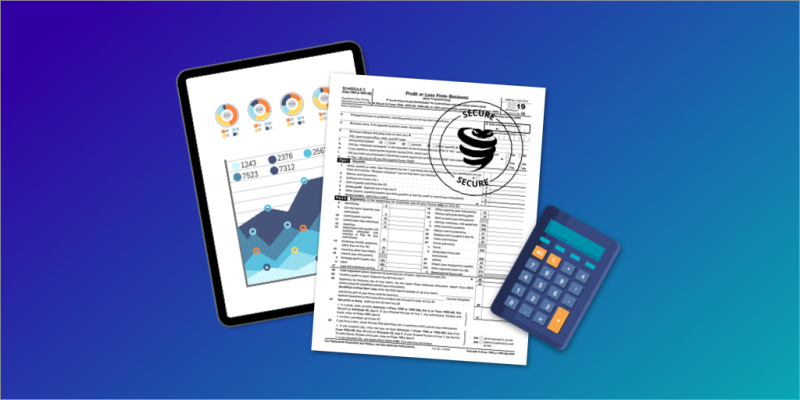
Privacy & Security
Why You Should Use a VPN to File Your 2019 Taxes
A Virtual Privacy Network is a great way to protect your personal data from being hacked this tax season
Whether you’re a CPA, a large accounting firm, or an individual tax filer, you want to keep your personal information—or the personal information of your clients—safe from hacking.
More and more people file their taxes online every year. According to the IRS, taxpayers e-filed more than 138 million returns in 2018, leaving the data of millions of Americans vulnerable to hacking and identity theft. If your data isn’t properly protected, cybercriminals can find your social security number or your bank account information—they can even steal your tax refund.
While there are a number of steps you can take to keep your data safe, one of the most effective ways is to use a virtual private network, or VPN. A VPN creates a secure, encrypted tunnel between your computer and servers operated by the VPN provider. So your connection—and all of the data flowing to and from the VPN server—is essentially invisible to your ISP, hackers and just about everybody else.
A VPN PROTECTS YOUR TAX DATA
Taxpayers and tax professionals can benefit from using a VPN in many ways. In fact, the federal government recommends that tax firms use a VPN so that branch offices and teleworkers can securely connect to the company’s computer system to send and receive information. (CPAs actually are required by law to protect the data of their clients.)
Here are some other ways taxpayers and accounting firms can benefit from using a VPN for filing tax returns:
1. Your Data is Kept Private
Because a VPN creates its own encrypted path for your data, only you—and those you choose to share the data with—can see it. VPN providers accomplish this by masking your IP address and essentially replacing it with one of their own. Given the competition for VPNs, you’ll want to sign up with a VPN provider that owns many IP addresses. That’s one reason VyprVPN is a good bet, because it owns more than 200,000 IPs.
2. Connect Worry-Free Over Public Wi-Fi
You’ve heard the warning many times: Don’t ever connect to an unsecured, public wireless network, such as what you’ll find in a coffee shop or airport. This is especially true when you’re working with tax data or filing your taxes because you risk exposing your personal, financial information to cybercriminals who may be lurking around. With a VPN, you can get online safely wherever you are, because you’re connected to a different server than the people around you. So your data is safe, even in an unsecured location.
3. Bypass Blocked Websites
Let’s face it, doing our taxes is about as much fun as cleaning up nail clippings. So it can be really frustrating when the process gets dragged out by a slow Internet connection or government-imposed restrictions. A VPN allows you to sail past those bottlenecks so you can access your data and file (hopefully) on time. Just keep in mind that not all VPNs offer this advantage. One reason users like VyprVPN is that it connects to servers in more than 70 countries, so they can get online just about wherever they are in the world. (VyprVPN also owns 100% of its hardware so our customers’ data is virtually invisible to cybercriminals and third parties.)
4. Hide Your Internet Traffic
What you do on the Internet is your business, especially when it comes to working with your personal, financial information. If you store your data on an online spreadsheet, such as Quickbooks Online, email tax documents to your CPA, or e-file your taxes, all that traffic can be viewable to cybercriminals, your ISP and third parties that want to sell your data. That’s why it’s essential to go with a VPN service provider that has a completely private policy on data logging. VyprVPN, for example, has a “no-log” policy, which means no one—not even the VPN service provider—can see what sites you’ve visited.
5. Avoid Government Surveillance
Governments around the world, including the United States, have weakened privacy laws, making your data more vulnerable to prying eyes. Using a VPN not only hides your data from your ISP and the government, they can’t even tell you’re using a VPN. And while Americans don’t have to tolerate the same kind of severe censorship that occurs in places like China and North Korea, you might encounter problems if you’re traveling in a restrictive country. Remember to first check on a country’s privacy laws; some ban or criminalize using a VPN.
6. Protect Your Data on Multiple Devices
A good VPN will allow you to download it on a number of devices, so you can get to your data quickly and easily. Select a VPN that works with different platforms, such as Mac and PC, Android and iPhone. VyprVPN offers a lot of flexibility, because it allows you to connect up to 5 different devices at once with one account.
Of course, you shouldn’t rely on only a VPN to protect your tax data. It’s important to take additional steps to keep it secure, such as using top-notch security software, creating strong, unique passwords, and encrypting files and folders. Also, not all VPN service providers are equal. Avoid free VPNs and look for those that have these attributes:
- Strong AES 256-encryption and DNS protection
- Personalized “kill switch” in case the VPN service is disconnected
- No third-party access
- Independent security audit
VyprVPN delivers on these benefits and a lot more so you can be assured that your tax data is kept private, safe and secure.
Our privacy policy is here.

